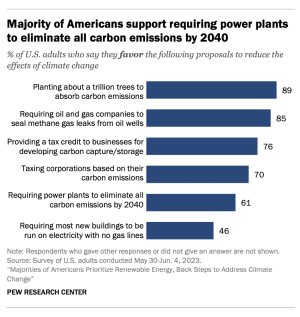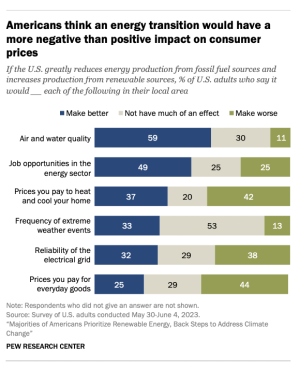People want both action and to keep using fossil fuels.
After rejoining the Paris Agreement and passing the Inflation Reduction Act, the US has committed to cutting its greenhouse gas emissions in half by the end of the decade and hitting net-zero emissions by the middle of the century. That will require significant changes in everything from household appliances and cars to how electricity is generated. Is the US public up for the challenge?
The answer is a pretty resounding "no," according to new polling data released by the Pew Research Center. While the country generally supports things like renewable energy, there's still strong resistance to taking personal actions like swapping out appliances. And the sizeable partisan gap in support for doing anything has persisted.
We need to do something!
In general, the US public supports action on climate change. Three-quarters of those surveyed said that the US should participate in international efforts to reduce climate change, and two-thirds say the US' top priority should be developing alternative energy sources.

There's also widespread support for specific climate-friendly policies. Tree planting programs have nearly universal support (89 percent of those surveyed), with similar levels of support for requiring companies to close methane leaks from oil and gas wells.
Strong majorities (70 percent and up) supported policies that induced companies to limit emissions, such as tax credits for carbon capture development, and emissions-based carbon taxes.
Over 60 percent of people even supported requiring all power plants to have zero emissions by 2040, a key step toward President Biden's climate goals.
As with most climate-related issues, there was a large partisan gap. A slim majority of Republicans felt that we should be prioritizing fossil fuel production, including coal. But these opinions were strongest in older, more conservative Republicans. Younger and more moderate Republicans tended to break ranks on things like promoting carbon capture and engaging in international climate treaties.
Democrats, in contrast, were nearly unified, with 90 percent of them saying that developing renewable energy should be the priority. The strong support for climate policies was widespread among left-leaning participants.
There were mixed thoughts about how the energy transition would go. Majorities or pluralities felt it would improve the environment, create job opportunities, and limit the frequency of extreme weather. But they were fairly evenly split about whether it would raise the cost of power and destabilize the electric grid, and a plurality felt that it would boost inflation on everyday goods.
And by we, I mean you

All that said, there was a remarkable ambivalence about taking some actions to limit climate change, with the key determinant seemingly being how directly affected people would be by the policy. You can see a bit of that in the above; people were optimistic about abstractions like job opportunities in the energy sector but pessimistic about things that have a direct impact, like the price of everyday goods. Similarly, a majority supported many policies that put the burden on corporations but couldn't reach majority-level support for blocking newly constructed buildings from having gas lines, which could potentially affect them.
Along the same lines, a strong majority was against doing away with gasoline-powered vehicles, with 59 percent opposing that as policy. And opposition has risen by nearly eight points over the past two years.
In general, the survey showed a general lack of understanding about everything that would need to be done to get off fossil fuels. Majorities of those responding haven't even considered getting a heat pump or electric hot water heater. The only reason a majority hadn't thought about installing an electric stove is that they're common enough that nearly a third of those polled already had one.
A more general finding is that a full 35 percent of those polled—again, mostly Republicans—say the US should never move off fossil fuels. Although the question was somewhat confusing, in that those who said we should not transition away from fossil fuels were then given the option to agree with eliminating their use eventually. It's unclear how those two options differed or why nearly two-thirds of the US failed to recognize that the transition is already in progress.
We have a failure to communicate
Comparing the percentages across different questions, it's clear that there's a substantial population within the US that is either confused or hasn't paid the topic careful attention. They're generally in favor of addressing climate change, but haven't recognized they have to participate in that process.
Things like automobiles and home appliances often have useful lifetimes that last into decades, meaning those bought today could still be in use within a few years of the net-zero timing that the US has committed to. But it appears that a substantial number of individuals would run out and buy fossil-fuel-powered hardware tomorrow, despite wanting to see the US act.
On the Republican side of the spectrum, it appears that opposition to doing anything about the climate has solidified. As recently as 2016, there was nearly equal support among Republicans and Democrats for solar and wind power, although likely for different motivations (pro-business and environmental, respectively). But recent labeling of any pro-environmental activity as "woke" seems to be having an effect, as Republican support for wind and solar has dropped by 15–20 percent. The majority of Republicans still support their use, but it's not clear if that will last.
If there's some reason for optimism about the partisan gap, it's that younger Republicans appear to be far more willing to act on the climate. It may take them until the US hits net-zero to become the majority, but there's definitely a chance that opposition will slacken over time.
The second thing is that, while Republicans were less likely to report their community had experienced extreme weather or fires, most of those who did correctly associated those with climate change. The US is currently experiencing a severe heat wave focused on the South and wildfire smoke has been spreading across most of the Northeast and Midwest, another sign that these events are becoming increasingly difficult to ignore. Ultimately, that bit of reality might help break down at least some of the partisan differences.




Recommended Comments
There are no comments to display.
Join the conversation
You can post now and register later. If you have an account, sign in now to post with your account.
Note: Your post will require moderator approval before it will be visible.